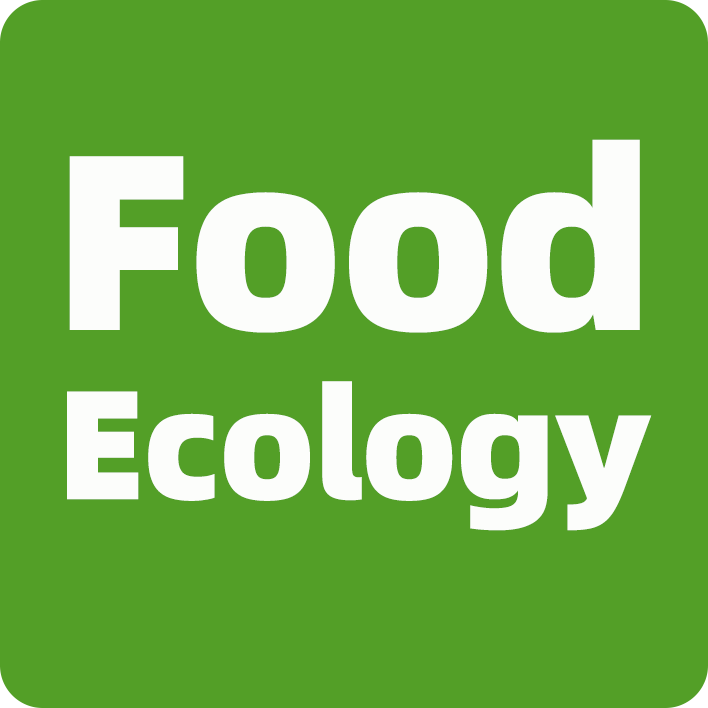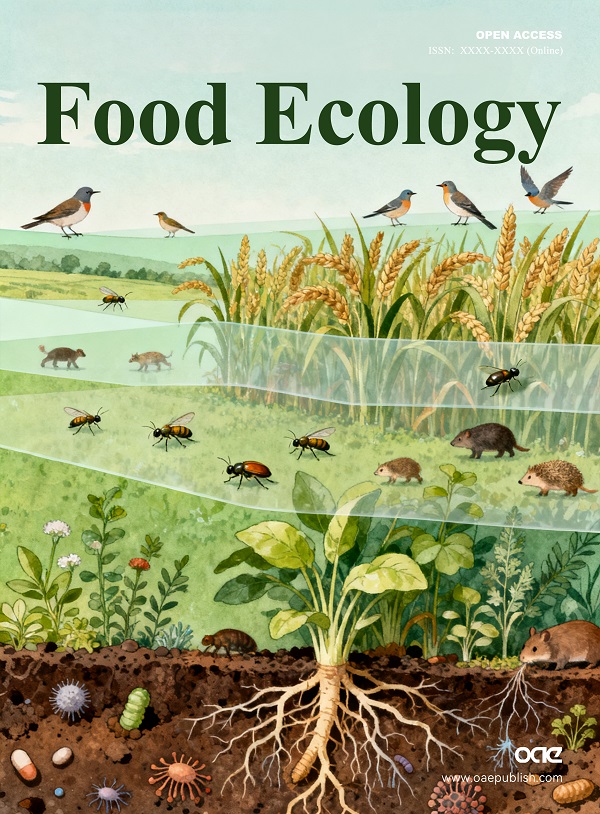Editorial: Introducing Food Ecology
Food Ecology is a golden open-access, peer-reviewed international journal dedicated to publishing transformative research at the intersection of food systems, ecological sustainability, and human and animal health. The journal provides a high-impact platform that integrates ecological science, agricultural innovation, food quality, nutrition, and environmental stewardship. By advancing a holistic understanding of the complex interactions that shape sustainable and resilient food-ecosystem systems, Food Ecology aims to inform strategies, innovations, and policies that support equitable, regenerative, and climate-smart food systems worldwide. The journal emphasizes interdisciplinary research that bridges natural sciences, technological advances, and social sciences to address urgent challenges in global food and nutritional security and ecosystem management.
Food ecology as a discipline emerged from the convergence of ecology, agronomy, food science, nutrition, and environmental management. Modern food production faces unprecedented challenges - soil degradation, biodiversity loss, water scarcity, climate change, and nutritional insecurity - that threaten the resilience and sustainability of agricultural systems. These issues are deeply interconnected, forming feedback loops that link agricultural practices, environmental change, food production, and human health. Understanding these relationships is essential for designing productive, climate-resilient, and environmentally responsible food systems. Growing populations, urbanization, and shifting dietary patterns further intensify pressure on food systems, underscoring the need for innovative, science-based solutions that are both scalable and sustainable.
Advances in soil and water science, ecosystem management, biotechnology, and digital agriculture offer powerful tools for addressing these global challenges. Soil health, nutrient cycling, and microbiome dynamics underpin the productivity and resilience of agroecosystems. Research on soil carbon sequestration, regenerative agriculture, and conservation practices highlights opportunities to mitigate climate change while enhancing yields. Likewise, water management - through efficient irrigation, reuse technologies, and the protection of aquatic ecosystems - remains central to sustainable agriculture. Innovations in precision agriculture, sensor networks, and digital monitoring platforms further enable efficient resource use, reduced environmental impacts, and improved crop quality.
Food quality, safety, and nutrition remain central to Food Ecology’s mission. The journal encourages research that integrates ecological principles with food technology, postharvest science, and the development of health-promoting foods. Food safety challenges persist worldwide, with chemical, microbial, and environmental contaminants posing risks to human health. Rigorous studies examining agrochemical residues, heavy metals, microplastics, and other emerging contaminants are essential for shaping regulatory frameworks and mitigation strategies. By linking ecological science with food innovation, the journal supports the development of food systems that safeguard both human health and environmental integrity.
Biotechnological and life-science approaches are also central to modern food ecology. Advances in molecular biology, genomics, microbiology, and systems biology enable improved crop productivity, enhanced livestock health, and the development of novel food products. Environmental biotechnology - including bioremediation, fermentation technologies, and biomaterials - offers new solutions to sustain ecosystem health and strengthen food production systems. Integrating these approaches with ecological frameworks facilitates systems-level understanding of the food-ecosystem nexus and supports evidence-based interventions that promote resilience and sustainability.
Food Ecology is particularly committed to advancing climate-smart and low-carbon agriculture. The journal highlights research on greenhouse gas mitigation, carbon sequestration, life-cycle assessments, and resource-efficient farming systems. Sustainable intensification, circular bioeconomy models, and innovations that reduce the environmental footprint of food production are central themes. By publishing studies that quantify environmental impacts and propose actionable mitigation strategies, the journal aims to support both policy development and on-the-ground practice across diverse agroecosystems.
The journal also recognizes the importance of social, economic, and policy dimensions in shaping sustainable food systems. Science-driven innovation must align with equitable governance, economic incentives, and social frameworks to achieve meaningful impact. Food Ecology, therefore, welcomes interdisciplinary research that connects ecological science with policy analysis, social science, and economic modeling. Such work contributes to a comprehensive understanding of food systems and supports the development of strategies that are scientifically robust, socially acceptable, and economically viable.
The journal publishes original research articles, comprehensive reviews, rigorous methodological studies, perspectives, and data-driven analyses. It particularly encourages contributions addressing sustainable agriculture, soil and water management, climate adaptation, food safety, and human nutrition. Cross-disciplinary and collaborative studies are highly valued, reflecting the interconnected nature of food-ecosystem systems and the need for integrated solutions for contemporary food system challenges.
The Food Ecology editorial team comprises internationally recognized scholars and practitioners with diverse expertise across ecology, agriculture, food science, and environmental engineering. Their editors are committed to rigorous peer review, high academic standards, and a fair, transparent publication process. The collective expertise ensures comprehensive coverage of the field while maintaining a unified vision for advancing scientific insight and practical applications in food ecology.
Looking ahead, Food Ecology aims to become a leading platform for pioneering research at the interface of food systems, ecological sustainability, and human health. By showcasing transformative studies, novel methodologies, and integrative approaches, the journal seeks to inspire researchers, practitioners, and policymakers to engage with the most pressing issues of our time and develop solutions that promote resilient, sustainable, and health-promoting food systems.
We warmly invite researchers, practitioners, and policymakers worldwide to submit their high-quality work, participate in peer review, and engage with Food Ecology. Through collaborative efforts, we can deepen our understanding of the food-ecosystem nexus, drive innovation, and develop sustainable solutions that benefit ecosystems, communities, and human well-being. Together, we can contribute to a more resilient, equitable, and sustainable global food future.
DECLARATIONS
Authors’ contributions
The author contributed solely to the article.
Availability of data and materials
Not applicable.
Financial support and sponsorship
Not applicable.
Conflicts of interest
Siddique, K. serves as the Editor-in-Chief of Food Ecology, but was not involved in any aspects of the editorial process, particularly in reviewer selection, manuscript handling, or decision making.
Ethical approval and consent to participate
Not applicable.
Consent for publication
Not applicable.
Copyright
© The Author(s) 2025.
Cite This Article
How to Cite
Download Citation
Export Citation File:
Type of Import
Tips on Downloading Citation
Citation Manager File Format
Type of Import
Direct Import: When the Direct Import option is selected (the default state), a dialogue box will give you the option to Save or Open the downloaded citation data. Choosing Open will either launch your citation manager or give you a choice of applications with which to use the metadata. The Save option saves the file locally for later use.
Indirect Import: When the Indirect Import option is selected, the metadata is displayed and may be copied and pasted as needed.
About This Article
Copyright
Data & Comments
Data












Comments
Comments must be written in English. Spam, offensive content, impersonation, and private information will not be permitted. If any comment is reported and identified as inappropriate content by OAE staff, the comment will be removed without notice. If you have any queries or need any help, please contact us at [email protected].